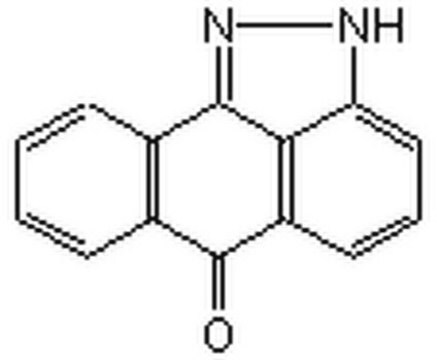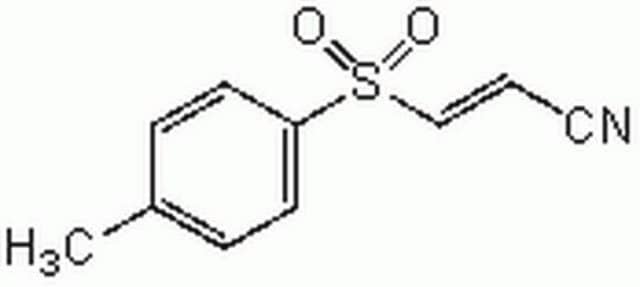559389
SB 203580
≥98% (HPLC), film (Thin), p38 MAP kinase inhibitor, Calbiochem®
Synonym(s):
SB 203580, 4-(4-Fluorophenyl)-2-(4-methylsulfinylphenyl)-5-(4-pyridyl)1H-imidazole, p38 MAP Kinase Inhibitor XVI
About This Item
Recommended Products
product name
SB 203580, SB 203580, CAS 152121-47-6, is a highly specific, potent, cell-permeable, selective, reversible, and ATP-competitive inhibitor of p38 MAP kinase (IC₅₀ = 34 nM in vitro, 600 nM in cells).
Quality Level
Assay
≥98% (HPLC)
form
film (Thin)
manufacturer/tradename
Calbiochem®
storage condition
OK to freeze
protect from light
solubility
DMSO: 30 mg/mL
shipped in
ambient
storage temp.
−20°C
InChI
1S/C21H16FN3OS/c1-27(26)18-8-4-16(5-9-18)21-24-19(14-2-6-17(22)7-3-14)20(25-21)15-10-12-23-13-11-15/h2-13H,1H3,(H,24,25)
InChI key
CDMGBJANTYXAIV-UHFFFAOYSA-N
General description
Biochem/physiol Actions
Warning
Other Notes
Powell, D.J., et al. 2003. Mol. Cell Biol.23, 7794.
Davies, S.P., et al. 2000. Biochem. J.351, 95.
Iwasaki, S., et al. 1999. J. Biol. Chem.274, 26503.
Gallagher, T.F., et al. 1997. Bioorg. Med. Chem. 5, 49.
LoGrasso, P.V., et al. 1997. Biochem. 36, 10422.
Hazzalin, C.A., et al. 1996. Curr. Biol.6, 1028.
Kramer, R.M., et al. 1996. J. Biol. Chem.271, 27723.
Saklatvala, J., et al. 1996. J. Biol. Chem. 271, 6586.
Cuenda, A., et al. 1995. FEBS Lett.364, 229.
Gallagher, T.F., et al. 1995. Bioorg. Med. Chem. Lett. 5, 1171.
Lee, J.C., et al. 1994. Nature 372, 739.
Legal Information
Signal Word
Warning
Hazard Statements
Precautionary Statements
Hazard Classifications
Acute Tox. 4 Oral
Storage Class Code
13 - Non Combustible Solids
WGK
WGK 3
Flash Point(F)
Not applicable
Flash Point(C)
Not applicable
Certificates of Analysis (COA)
Search for Certificates of Analysis (COA) by entering the products Lot/Batch Number. Lot and Batch Numbers can be found on a product’s label following the words ‘Lot’ or ‘Batch’.
Already Own This Product?
Find documentation for the products that you have recently purchased in the Document Library.
Customers Also Viewed
Our team of scientists has experience in all areas of research including Life Science, Material Science, Chemical Synthesis, Chromatography, Analytical and many others.
Contact Technical Service












